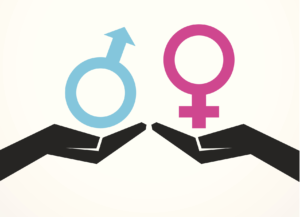
Doctor weighing patient on scale
I met with a new specialist to talk about the osteoporosis I’ve developed in my left femur. I have multiple risk factors for this condition: family history, small-boned, thinner, white.
My internist advised me to consult with a rheumatologist to see what further steps I should take. As we were talking, Dr. M asked what kind of work I do, and I gave a quick spiel about how I help people quit dieting and use a Health At Every Size® (HAES) framework.
And then I couldn’t help myself. “So often, people at higher weights are told that weight loss is the solution to their medical problems,” I said. “But here I am with osteoporosis because I’m thinner. Nobody has suggested I gain weight to help the condition.”
As a look of surprise crossed her face, I kept going. “I wonder how much weight I’d need to gain to see improvement.”
She actually told me the number of pounds – and a look of horror now appeared. “But don’t do it!” she exclaimed.
I don’t plan to do it because my body weight is where it’s meant to be. Instead, we went over possible strategies. Although I’m physically active and take calcium regularly, she told me that neither is enough to solve my risk. She wanted to do some further testing, followed by the possibility of a new medication to strengthen my bones.
As I’ve dealt with this issue over the years, none of my medical providers has ever suggested I try to change my weight, but higher weight folks are frequently given this as the first solution. What’s going on?
Fat phobia. Weight stigma.
I have alternatives to deal with my osteoporosis – including deciding not to do anything, which is my plan. No one is looking at my development of osteoporosis – and my decision to do nothing for now – as a moral issue.
In my work as a therapist, I witness all kinds of situations where clients believe (and have been told) that weight loss is the solution to their medical and/or psychological concerns.
But there’s good reason to take weight out of the equation.
If you’re practicing sustainable behaviors that support your body – the way you feed yourself, engage in physical activity, and practice healthy sleep patterns, to name a few – then your body will settle where it settles.
Of course, I want to acknowledge that there is no obligation to practice any particular behavior, and people’s life circumstances vary in their access to resources.
But what I’m getting at is: In order to try to change your body weight, you’d have to do something disordered to get there – like under eating or over-exercising – which no longer truly supports your body.
It’s not logical to prescribe or pursue weight loss to solve physical conditions and emotional struggles.
Here are six common situations where people focus on weight loss – even though the pursuit of weight loss usually worsens, rather than helps, them.
1. I Need to Lose Weight to Be Healthy – Even Though I Already Am
A client came to me because of her struggles with overeating and weight. Her doctor told her, “You’re the healthiest fat person I’ve know.” Still, the doctor said it was imperative she lose weight or she’d end up developing health issues as she aged.
When I met Greta, she was trying to eat “healthy” (salads, fruit, yogurt) so she’d lose the pounds. In her demanding accounting job, she frequently skipped meals, which she believed would help her lose weight. Not surprisingly, she found herself bingeing in the evenings.
She’d also quit exercising. A combination of “why bother if I’m not losing weight?” and a feeling that exercise was punishment for her larger body made physical activity unappealing, even though she could remember times in her life where she truly enjoyed it.
In the end, she developed a satisfying relationship with food, stopped bingeing, and engaged in regular physical activity. She said she felt great!
Greta’s weight didn’t change. She told me her doctor agreed with my approach and was pleased with the results with one exception – she should still lose weight.
Take Weight Out of the Equation:
All of these sustainable behaviors made Greta’s body feel better. But she couldn’t accept that her weight wasn’t changing and decided to stop therapy. Yet she’d developed practices that were sustainable, supported her body, and left her feeling better emotionally.
To do anything differently to get that coveted weight loss would mean reinstituting disordered behaviors. Since the focus for her doctor was staying healthy, practicing unhealthy behaviors makes no sense!
2. I Know That When I Stop Overeating, I’ll Lose Weight
Maybe. Maybe not.
Most people who come to see me about their overeating want to lose weight. They’ve usually tried numerous diet plans and lost lots of pounds, followed by weight regain.
It’s become common knowledge that diets don’t work. People now disguise their diets by saying they “eat clean” or other euphemisms that mean, “I’m going to restrict some part of my eating to lose weight.”
And it’s understandable, given weight stigma, that people want to lose weight in order to become “acceptable” by cultural convention.
Yet we know that food restriction – even when called something else – doesn’t work. For most people, putting a particular food or food group off limits makes it glitter. Sure, you can stay away for a while. But when you break through restrictions, you’re going to eat more than your body needs. You may binge. You’ll probably feel out of control.
And if it’s sugar that you’ve been avoiding, the intensity of your response may make you believe you’re addicted. All of which seem to prove your hypotheses that these are “dangerous” or “bad” foods you need to avoid.
Other people stick with the restrictions, overruling their physiological hunger needs and go on to develop disordered eating patterns, orthorexia, and/or a full–blown eating disorder.
Weight may be lost, but this is not healthy eating or healthy for your body.
Take Weight Out of the Equation:
Let’s say you’ve become an attuned/intuitive eater. You’ve ended the deprivation of dieting. You welcome your hunger, choose from a wide variety of foods that taste and feel good in your body, and eat until you’re satisfied. You no longer binge.
You also understand that, for example, if eating gluten causes a reaction – perhaps you have celiac disease – then eliminating gluten makes good sense. (If you’re cutting out gluten because it’s supposed to help you lose weight, then you’re subject to the same physiological and psychological consequences that lead to diet failure.)
Perhaps you lose some weight as a side effect of these sustainable practices. That’s fine – no one is against weight loss. But maybe you don’t.
It really doesn’t matter why you don’t because if you’re feeding yourself in the way that nourishes you the best you can, to do anything else would be disordered.
3. I Have [Diabetes, High Cholesterol, Osteoarthritis, Etc.], So I Have to Lose Weight
Along with the diagnosis of diabetes/pre-diabetes frequently comes the recommendation to lose weight. But we already know there’s no evidence of any particular plan that leads to sustainable weight loss.
Lindsay initially focused on weight loss, leaving her feeling deprived and disappointed: She didn’t lose weight, and her blood sugar remained too high. I referred her to a dietitian who explained that research now suggests weight gain may be a result of insulin resistance, not the cause.
Instead, she helped Lindsay consider: How do particular foods affect your blood sugar? What happens to blood sugar if you’re physically active versus sedentary?
Take Weight Out of the Equation:
Ask for the same treatment that people at lower weights receive. To do anything else puts you at risk of missing out on the sustainable behaviors that will best support your body.
A client of mine recently consulted with an orthopedist about the knee pain. She began the conversation, “You can see I’m fat, and I know I’m fat. I know my weight may affect my knees, and I also know that you see people with knee problems who aren’t fat. My weight may not change, so I want to be offered the same treatment you’d give them.”
He heard her. He talked about a variety of options and the order he would try them. He did mention that some weight loss could lessen the issue.
But he didn’t demand it, shame her, or withhold treatment. Instead, he offered a solution and a plan to follow up.
4. I’m an Emotional Overeater – When I Learn to Deal with My Feelings, I’ll Lose Weight
Food is the way we’re first soothed, so it makes sense that in times of discomfort, you may turn to food to calm, distract, or even numb yourself.
People talk about food as a way to cope with all sorts of feelings: sadness, anger, loneliness. Typically there’s a belief – often reinforced by mental health professionals – that once they develop other ways of handling these emotions, weight loss will occur.
If you develop different ways manage your life struggles that serve you better, that’s wonderful! It says nothing about where your weight will ultimately settle.
Take Weight Out of the Equation:
Lori used counseling to speak about traumatic events in her life that she’d never given voice to. As she shared her stories, healing began.
She learned how to reach out to others for connection in times of trouble, and her newfound ability relate from an authentic place in herself helped her to feel more at ease with her emotions. At the same time, she worked on ending the deprivation of dieting and honoring her hunger and fullness.
I won’t say whether or not her weight changed because it doesn’t matter. She developed eating patterns and connections with family and friends that nourished her. To use weight as a measure of her success would diminish the fullness of the life she now leads.
5. I Feel So Much Shame in My Body
Shame threatens us: Are we worthy? Will others stay connected to us?
People experience lots of shame about weight. You’re being told that the body you have isn’t right (and it shows – everyone can see your shame). You do what you’re supposed to by dieting to lose weight (and the shame). It usually works at first – you lose some weight, people compliment you, and you feel like you’ve got it this time.
But due to physiological and psychological reasons beyond your control, chances are, the weight will return. Those people who complimented you are now quiet. That silence is shaming. Shame is insidious.
Many people remember the first time they were shamed about weight or food. The painful words may have come from family members, peers, and/or health professionals. You remember exactly what those words were (maybe they’re still being told to you) and how they penetrated your soul.
Lots of disordered eating, eating disorders, and over exercising comes from attempts to make yourself feel that you are “good enough.”
Take Weight Out of the Equation
As Gwen talked about her difficulty going to social events in her larger body, I suggested, “Imagine that your size is considered the norm in our culture. On billboards, in magazines, in movies, the people you see look like you.”
Without missing a beat, Gwen said that instead of feeling hesitant and undeserving, she’d be confident. Gwen is a smart, gregarious woman, and the prospect of her being able to go to parties and enjoy herself is delightful.
But it’s not easy.
Brene Brown teaches that the antidote to shame is empathy. Finding people to connect with around body shame and weight stigma can help you move from shame to empowerment.
Shaming yourself doesn’t work, and it hurts you. If you have troubled relationships with the people who shamed you, no amount of weight loss will make you truly feel safe. After all, what happens if the weight returns?
There are podcasts, blogs, and Facebook groups that can connect you with a growing community of people who’ve made a decision to focus on losing the shame, not the weight. They’d love to have you join them!
6. This Isn’t My Natural Weight
You may not be at the weight you used to be. Our “natural” weight typically changes through the life cycle.
Your body has a weight regulation system that’s beyond your conscious control. Linda Bacon writes:
This jiggling is like a power struggle to wrest control away from your body’s innate weight-regulation mechanism, and in the end, it only makes your body fight harder to retain control. The result: Your body forces you to not only regain any weight you’ve lost, but you may even pay a penalty with extra weight gain – and a setpoint now set higher to protect against future diets.
If you’re at a higher body weight – or have a fear of weight gain – there’s a good chance you’ve dieted. When you do, metabolism slows down, hunger hormones rise, and food tastes even better. It doesn’t matter how much willpower you believe you have (unless you can override your hunger cues, putting you at risk to enter disordered eating territory).
Take Weight Out of the Equation:
It’s helpful to consider the wisdom of the body, which, after all, has evolved over millions of years.
I recently came across a blog that talks about why weight gain – particularly belly fat – is important after menopause as a way to regulate estrogen production as we age. Our bodies are pretty awesome!
Instead of buying into the hype about how to fight fat in middle age – by now, you know the drill – it makes a lot more sense to incorporate whatever practices you believe support your body as it changes over the years.
If we accepted that it’s normal for our bodies to change over the lifespan, imagine the relief! One of my favorite quotes in The Diet Survivor’s Handbook states, “No man walks in the same river twice. For he is not the same man, and it is not the same river.”
***
Weight may be a factor in some of the challenges you experience in life. It certainly is a factor in my osteoporosis. But just like you don’t expect to increase your height to reach things more easily, or decrease your height so you don’t bump into low hanging ceilings, work toward respecting the body you have.
From that place of strength, you can take whatever steps serve you in addressing whatever issues you want to address.
And if you have some more energy, work toward ending weight stigma, because that’s something damaging people’s physical and emotional health that we actually can change – without doing harm.
[do_widget id=’text-101′]
Judith Matz, LCSW is a clinical social worker, speaker, and co-author of The Diet Survivor’s Handbook (2006) and Beyond a Shadow of a Diet (2nd Edition, 2014), and author of Amanda’s Big Dream (2015). Learn more at her website, where you can also sign up for the free Diet Survivor’s Group quarterly newsletter.
Search our 3000+ articles!
Read our articles about:
Our online racial justice training
Used by hundreds of universities, non-profits, and businesses.
Click to learn more
Most Read Articles
- « Previous
- 1
- …
- 30
- 31
- 32



















